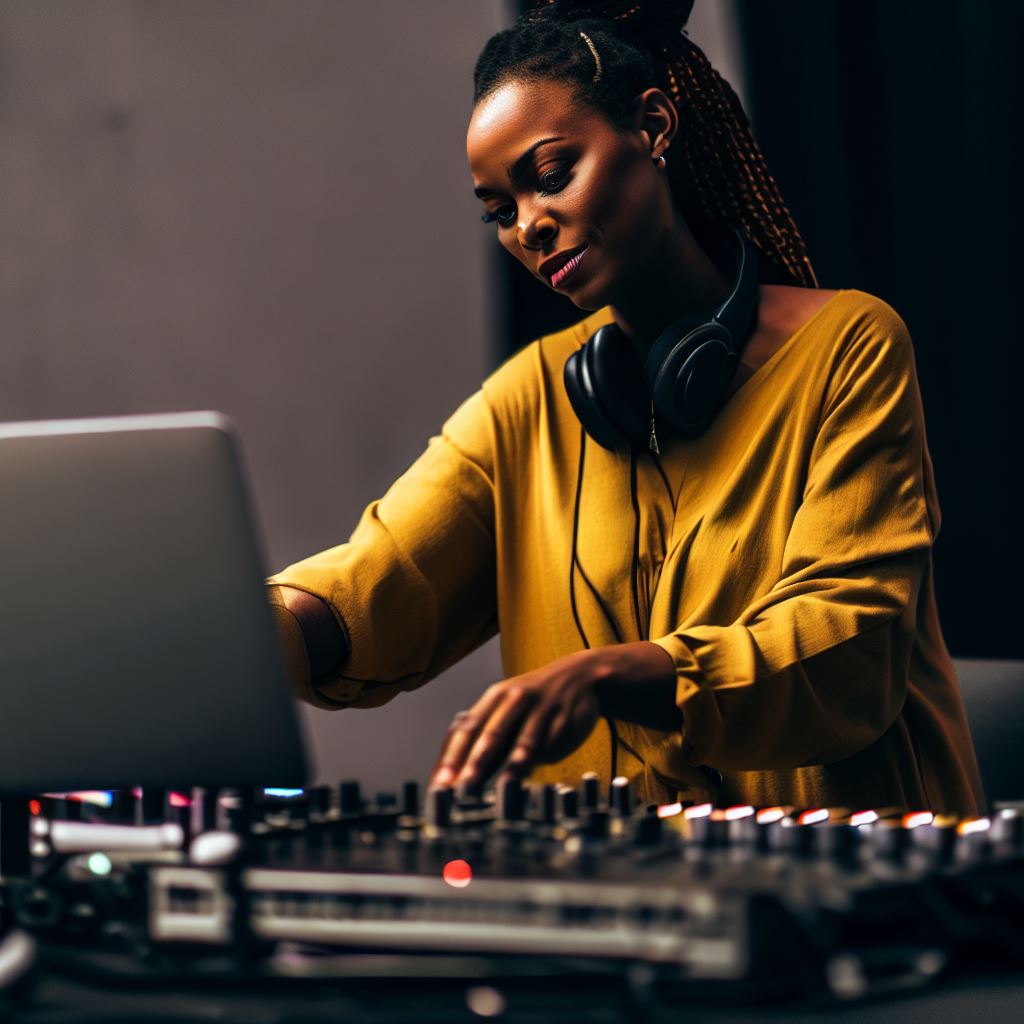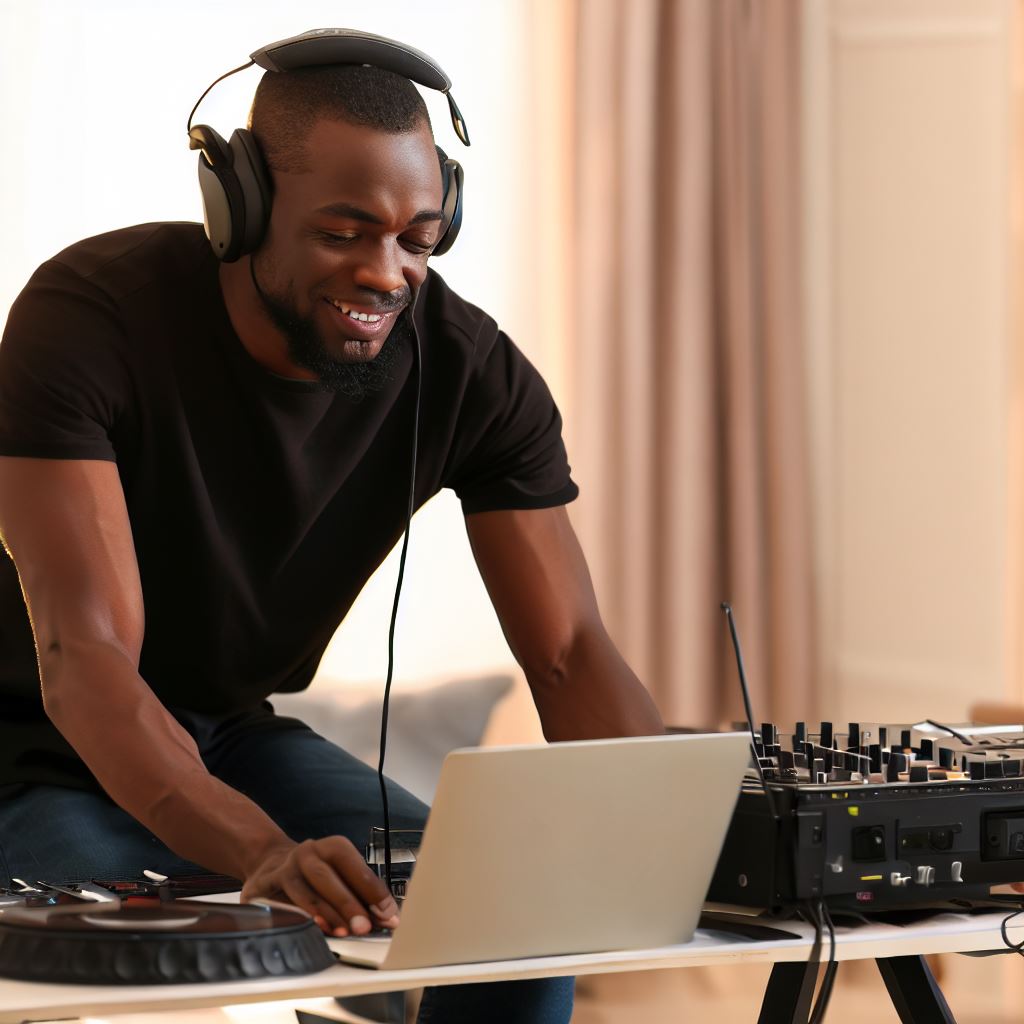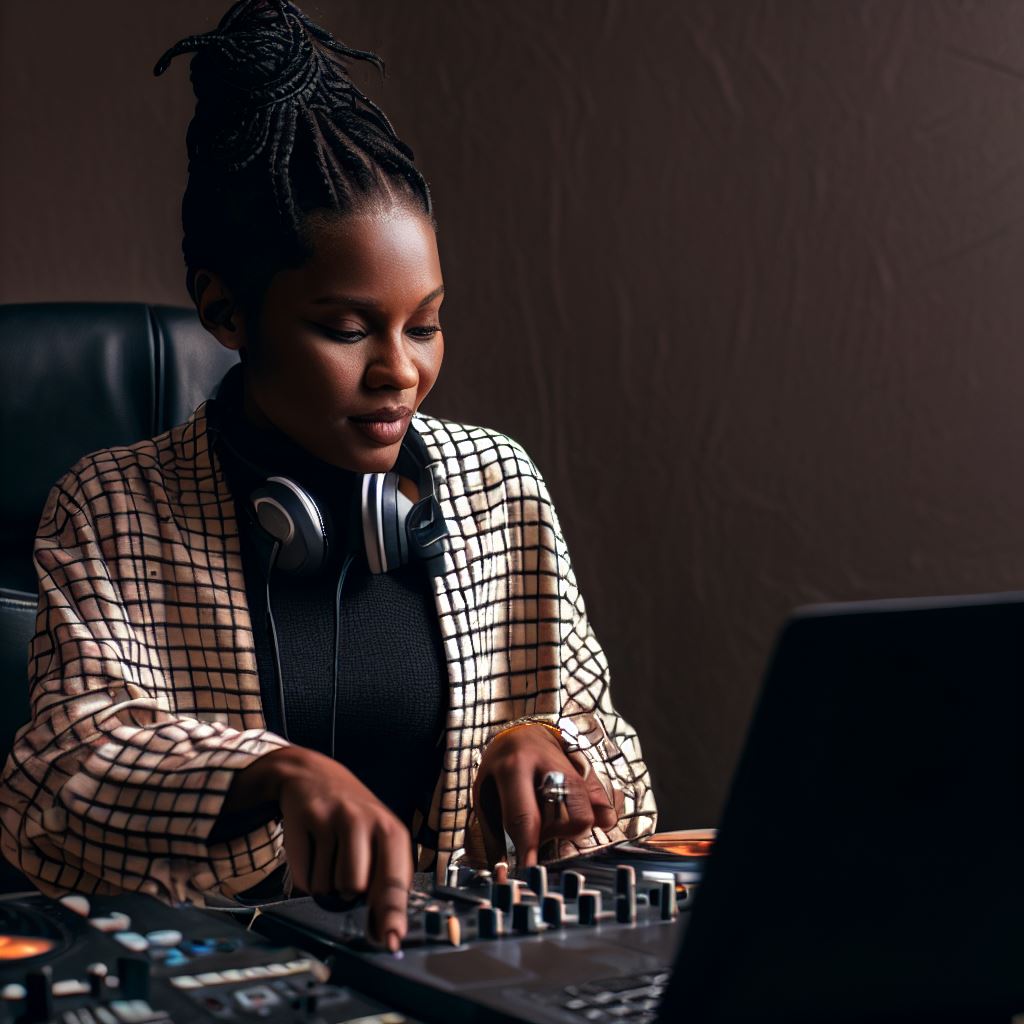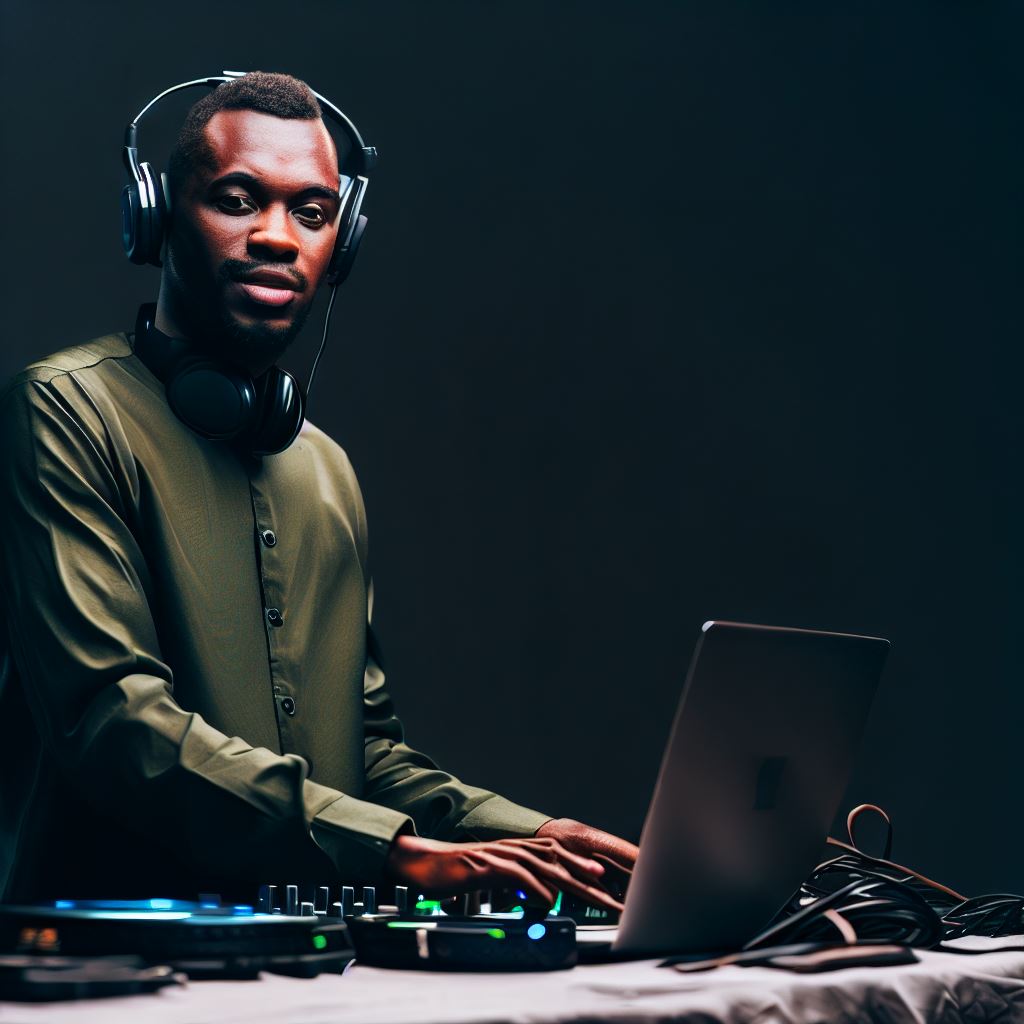Introduction
Overview of nightlife culture in Nigeria.
Nigeria has a vibrant nightlife culture, with a thriving music and entertainment scene that attracts locals and tourists alike.
Importance of club DJs in the Nigerian nightlife scene.
Club DJs play a critical role in shaping the atmosphere and energy of Nigeria’s nightlife.
- They are the pulse of the party, keeping the crowd engaged and entertained.
- Club DJs are trendsetters, introducing new music genres and styles to the Nigerian audience. They have the ability to create a unique vibe that elevates the clubbing experience.
- These DJs have extensive knowledge of various music genres, blending them seamlessly to cater to diverse tastes.
- They know how to read the crowd, knowing exactly when to switch tracks and create memorable moments.
- Their skillful mixing techniques and ability to create smooth transitions between songs enhance the flow of the night, keeping the energy high and maintaining the crowd’s enthusiasm.
- Beyond the technical aspects, club DJs also serve as tastemakers and influencers. They introduce new artists and songs, helping to promote and grow the Nigerian music industry.
- DJs are often the driving force behind successful collaborations between artists, creating a platform for emerging talents to showcase their skills.
In general, club DJs play an essential role in Nigeria’s nightlife culture. They set the stage for unforgettable nights, keeping the energy high and creating an atmosphere that draws people to the clubs.
Their influence extends beyond the dance floor, contributing to the growth and development of the Nigerian music scene.
History of Nightlife in Nigeria
When discussing the nightlife in Nigeria, it is important to understand its history, evolution, and the role of club DJs in shaping the experience.
Brief overview of the origins of nightlife in Nigeria
- The concept of nightlife in Nigeria can be traced back to traditional festivals and ceremonies.
- These festivities brought communities together, providing entertainment through music, dance, and cultural performances.
- Traditional music played a significant role in these events, creating an atmosphere of joy and celebration.
- As Nigeria’s urban centers grew, a shift occurred, and nightlife expanded beyond traditional festivities.
Evolution of nightlife culture in major Nigerian cities
- Lagos, Nigeria’s commercial hub, played a vital role in the evolution of the country’s nightlife.
- In the 1960s, Lagos experienced an influx of music genres such as highlife, juju, and Afrobeat.
- These genres became popular in nightclubs and live music venues, attracting diverse audiences.
- The 1970s brought the emergence of the vibrant “Afro Nightlife” culture in Lagos.
- Disco and funk music took over the scene, and nightclubs became a hub for people to socialize.
- Other major Nigerian cities like Abuja, Port Harcourt, and Enugu also saw the rise of their own unique nightlife scenes.
- Nightclubs, bars, and lounges became integral to the urban lifestyle, offering diverse entertainment options.
Role of club DJs in shaping the nightlife experience
- Club DJs play a crucial role in creating the energetic and immersive atmosphere of Nigerian nightlife.
- They curate and mix different genres of music, keeping the crowd engaged and on their feet.
- DJs have the power to set the mood, transition between tracks seamlessly, and create memorable experiences.
- They are responsible for staying updated with the latest music trends, ensuring the audience stays entertained.
- Nigerian club DJs have become influential figures, often introducing new sounds and artists to the scene.
- They have played a significant role in the promotion of Nigerian music globally, contributing to its rise in popularity.
- Through their performances, club DJs create a sense of unity and collective enjoyment among the audience.
In summary, understanding the history of nightlife in Nigeria helps recognize its cultural significance and impact on society.
Nightlife has evolved from traditional festivities to encompass a diverse range of experiences in major cities like Lagos, Abuja, and Port Harcourt.
Club DJs have played a vital role in shaping the nightlife culture, creating immersive atmospheres and promoting Nigerian music.
Their influence extends beyond the dancefloor, contributing to the country’s music industry on a global scale. Nigerian nightlife continues to thrive, offering vibrant and dynamic experiences for locals and tourists alike.
Read: Spotlight on Female DJs: Breaking Barriers in Nigeria
The Rise of Club DJs in Nigeria
Introduction to the emergence of club DJs in Nigeria
- Nigeria has witnessed a significant rise in the prominence and influence of club DJs.
- These DJs have become an essential part of the vibrant nightlife scene in the country.
- Their role goes beyond playing music; they create an immersive experience for club-goers.
- Nigerian club DJs have gained recognition both nationally and internationally for their talent.
Influential individuals who pioneered the DJ culture
- DJ Jimmy Jatt is considered one of the pioneers of the DJ culture in Nigeria.
- He introduced a unique style of mixing and blending various genres of music.
- Other influential DJs like DJ Neptune and DJ Xclusive have contributed to the growth of the DJ scene.
- These trailblazers have inspired a new generation of DJs and shaped the industry.
Impact of international DJs on Nigerian club scene
- International DJs have played a vital role in shaping the Nigerian club scene.
- They bring diverse music styles and trends from around the world to Nigerian clubs.
- They collaborate with local DJs and artists, creating a fusion of global and local sounds.
- International DJs also attract a wider audience and elevate the overall club experience.
Growth of DJ academies and training programs
- The increasing demand for skilled DJs has led to the growth of DJ academies in Nigeria.
- These academies provide professional training programs to aspiring DJs.
- Students learn various techniques, including mixing, scratching, and crowd engagement.
- DJ academies also offer business and marketing skills to help DJs build their brands.
The rise of club DJs in Nigeria has been a game-changer for the country’s nightlife scene. These DJs have brought innovation, energy, and a unique musical experience to clubs across the nation.
With the emergence of DJ academies and training programs, more aspiring DJs can now develop their skills and pursue a career in this thriving industry.
Read: Digital vs Vinyl: The DJing Landscape in Nigeria Today
Role and Responsibilities of Club DJs
In the world of nightlife in Nigeria, club DJs play an essential role in providing a memorable experience for club-goers.
They are the lifeblood of any club, responsible for creating the right ambiance and energy that keeps the crowd coming back for more.
Providing the right ambiance and energy for club-goers
Club DJs have the power to set the mood and create an atmosphere that is conducive for dancing, socializing, and having a good time.
They carefully select tracks that will resonate with the crowd, taking into consideration the genre, tempo, and energy level of the music.
- They analyze the crowd’s reaction and adjust the music accordingly to maintain a high level of energy.
- They mix different tracks seamlessly, ensuring a continuous flow of music that keeps people engaged and on the dancefloor.
- They use their technical skills to create transitions and buildups that heighten the anticipation and excitement of the crowd.
Creating a seamless and captivating music experience
Club DJs are masters of their craft, capable of manipulating music to create a unique and captivating experience for the audience.
Using various tools and techniques, they take the crowd on a musical journey that keeps them hooked throughout the night.
- They carefully curate playlists, considering the crowd’s preferences and the club’s theme or event.
- They blend different genres and styles of music, creating a dynamic and diverse set that caters to everyone’s taste.
- They incorporate their personal style and creativity into their sets, adding their unique touch to familiar tracks.
- They utilize effects and samples to enhance the music, creating surprises and moments of awe.
Ability to read the crowd and adapt the music selection
One of the most crucial skills a club DJ possesses is the ability to read the crowd and understand their preferences and mood.
They must have a keen sense of observation to gauge the crowd’s energy levels and adjust the music accordingly.
- They pay attention to the audience’s reactions, such as dancing, cheering, or tiredness, to determine the success of their music choices.
- They are skilled at recognizing trends and popular tracks, incorporating them into their sets to keep the crowd engaged.
- They know how to balance between playing crowd favorites and introducing new, cutting-edge music to keep the experience fresh and exciting.
Mixing and blending techniques used by club DJs
Club DJs are experts in mixing and blending music seamlessly, ensuring a smooth transition between tracks. Their technical prowess allows them to create a flawless and uninterrupted music experience.
- They use beatmatching techniques to synchronize the beats of two different tracks, ensuring a seamless transition.
- They employ harmonic mixing, matching the musical key of one track to another, creating a harmonious and pleasant sound.
- They utilize loop and cue points to extend or repeat sections of a song, manipulating it to fit the energy of the crowd.
- They employ various DJ software and equipment, such as turntables, mixers, and controllers, to enhance their mixing capabilities.
In short, the role and responsibilities of club DJs in Nigeria’s nightlife scene are indispensable.
They provide the right ambiance and energy, create a seamless and captivating music experience, adapt to the crowd’s preferences, and demonstrate exemplary mixing skills.
Without them, the nightlife experience would be incomplete.
Read: Influence of Nigerian DJs in Promoting Local Talents
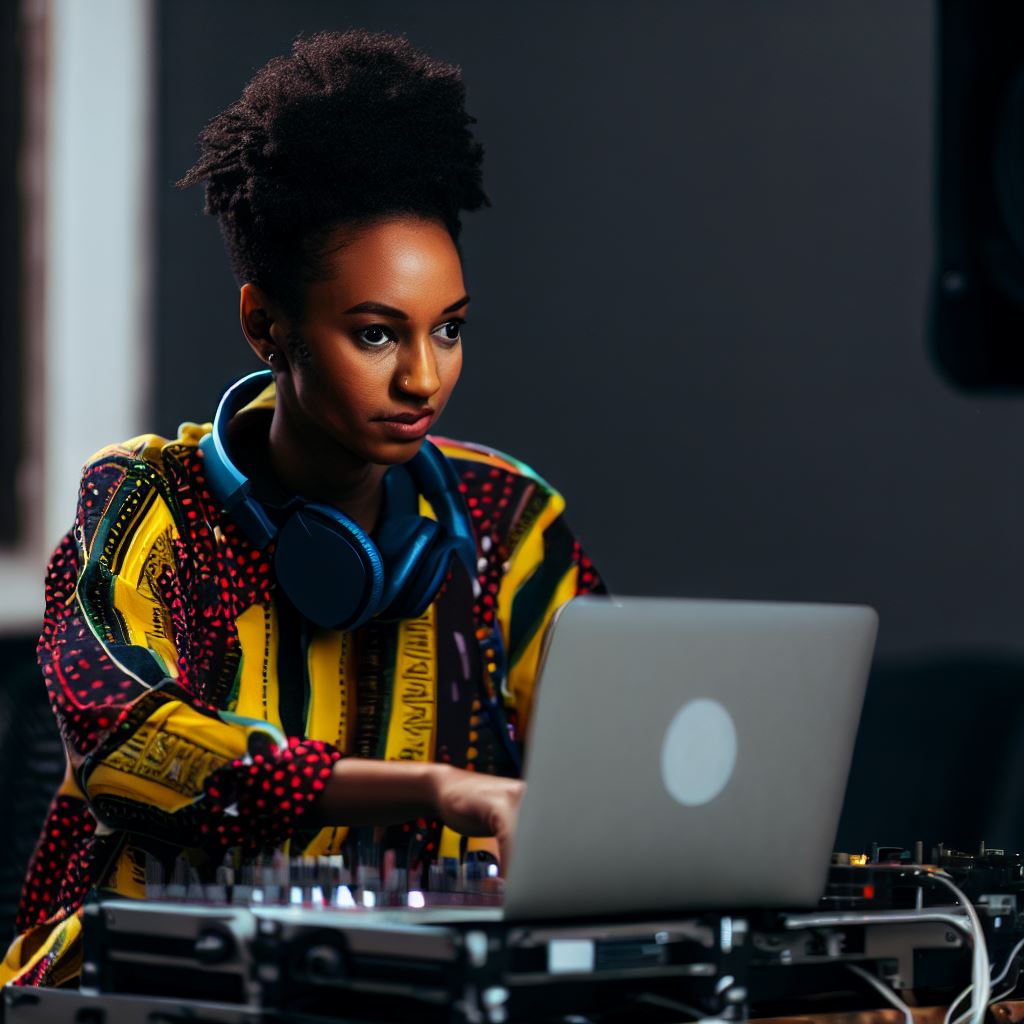
The Transformation of Nightlife with Club DJs
Breakdown of the various music genres played by club DJs
- Hip-Hop: Club DJs in Nigeria have played a crucial role in popularizing hip-hop music in nightclubs.
- Afrobeat: DJs have also been essential in spreading the infectious rhythms of Afrobeat music.
- Dancehall: Club DJs incorporate dancehall into their sets to create an energetic atmosphere for partygoers.
- Highlife: DJs who specialize in Highlife music cater to a specific audience looking for a taste of traditional Nigerian sounds.
- EDM: Electronic Dance Music has gained popularity, and club DJs have embraced this genre to cater to a diverse crowd.
Influence of club DJs on Nigerian music industry
- Introducing new artists: DJs have the power to promote upcoming Nigerian artists and propel them to stardom.
- Creating trends: DJs have the ability to set trends by introducing new music and genres to the Nigerian audience.
- Shaping musical preferences: Club DJs heavily influence the music choices of partygoers, shaping their preferences.
- Collaborating with artists: DJs often collaborate with established Nigerian musicians, contributing to the growth of the music industry.
- Elevating local talent: DJ-led events and initiatives offer opportunities for local artists to showcase their skills and gain recognition.
Collaborations between club DJs and Nigerian artists
- Producer-DJ collaborations: Many DJs in Nigeria have ventured into music production and collaborated with artists on hit tracks.
- Live performances: DJs frequently accompany Nigerian artists during live performances, adding a dynamic element to their shows.
- Remix culture: Club DJs often remix Nigerian songs, giving them a fresh twist and attracting a wider audience.
- Cross-genre collaborations: DJs collaborate with artists from different genres, creating unique and innovative sounds.
- Expanding fanbases: Collaborations with club DJs expose Nigerian artists to new fanbases, both locally and globally.
DJ-led events and concerts revolutionizing the nightlife scene
- DJ showcases: DJs organize events where they take center stage, showcasing their skills and entertaining the audience.
- Theme parties: DJs create themed parties based on specific music genres, creating an immersive experience for partygoers.
- Concerts featuring DJs: DJs headline their own concerts, attracting a dedicated fanbase who appreciate their individual style.
- Music festivals: Club DJs play a vital role in music festivals, curating lineups and entertaining thousands of attendees.
- VIP experiences: Exclusive events with renowned DJs offer premium experiences, attracting a sophisticated crowd to the nightlife scene.
In a nutshell, club DJs have transformed the nightlife scene in Nigeria through their diverse music genres and collaborations with Nigerian artists.
From introducing new talents to shaping musical trends, DJs play a significant role in the growth of the Nigerian music industry.
Through DJ-led events and concerts, they have revolutionized the way Nigerians experience nightlife, providing unique and immersive experiences for partygoers.
Read: The Impact of Nigerian DJs on the Global Music Scene
Challenges Faced by Club DJs in Nigeria
Lack of recognition and support from the music industry
- Club DJs in Nigeria often struggle with a lack of recognition and support from the music industry.
- Despite their crucial role in the nightlife scene, DJs are often overlooked and undervalued.
- This lack of recognition leads to limited opportunities for growth and development in their careers.
- DJing is often seen as a hobby rather than a legitimate profession, further hindering their progress.
- Without proper recognition and support, many talented DJs struggle to make a sustainable living.
Competition in the growing DJ community
- The DJ community in Nigeria is growing rapidly, leading to increased competition among DJs.
- New DJs entering the scene make it difficult for established DJs to maintain their prominence.
- With more DJs vying for limited opportunities, it becomes challenging to stand out and gain recognition.
- DJs have to constantly innovate and improve their skills to stay relevant and competitive.
- The fierce competition can be demotivating and discouraging for many aspiring DJs.
Technological advancements and the need to keep up
- Technological advancements have revolutionized the DJing industry, posing challenges for DJs in Nigeria.
- DJs need to stay updated with the latest equipment, software, and techniques to deliver high-quality performances.
- The cost of acquiring and maintaining modern DJ equipment can be prohibitive for many DJs.
- Additionally, DJs need to continuously adapt to new technologies, such as digital music platforms and streaming services.
- Falling behind in terms of technological advancements can result in losing opportunities and relevance in the industry.
Balancing creativity with commercial demands
- Club DJs in Nigeria often face the challenge of striking a balance between their creative aspirations and commercial demands.
- While DJs want to express their unique style and musical preferences, they also need to cater to the audience’s preferences.
- Commercial demands often require DJs to play popular tracks and adhere to specific genres that are currently trending.
- This pressure to please the crowd and meet commercial expectations can restrict their artistic freedom.
- DJs need to find a balance where they can showcase their creativity while also satisfying the audience and venue owners.
All in all, club DJs in Nigeria face various challenges that hamper their professional growth and recognition.
The lack of support from the music industry, competition within the DJ community, the need to keep up with technological advancements, and balancing creativity with commercial demands all pose significant hurdles.
However, despite these challenges, DJs continue to play a vital role in the country’s nightlife, entertaining crowds and creating memorable experiences.
Read: Successful Women Songwriters in the Nigerian Scene
Conclusion
Recap of the essential role of club DJs in Nigerian nightlife
Club DJs play an essential role in Nigerian nightlife, creating vibrant and energetic atmospheres in the clubs.
Appreciation for the contributions of club DJs to Nigerian music and culture
Their contributions to Nigerian music and culture should be appreciated and recognized.
Encouragement to support and celebrate club DJs in Nigeria’s nightlife scene
It is important to support and celebrate club DJs as they continue to enhance Nigeria’s nightlife scene.
Recap of the essential role of club DJs in Nigerian nightlife
- Club DJs set the nightlife vibe.
- They curate electrifying playlists.
- Keep the dance floor alive.
- Create memorable experiences.
- DJ skills are an art.
Appreciation for the contributions of club DJs to Nigerian music and culture
- DJs amplify Nigerian music.
- Promote local artists.
- Blend diverse genres.
- Shape cultural trends.
- Influence fashion and style.
Encouragement to support and celebrate club DJs in Nigeria’s nightlife scene
- Acknowledge their impact.
- Attend local DJ events.
- Promote their work.
- Collaborate with DJs.
- Nurture emerging talents.
- Keep the nightlife vibrant.
- Together, we groove to success.

